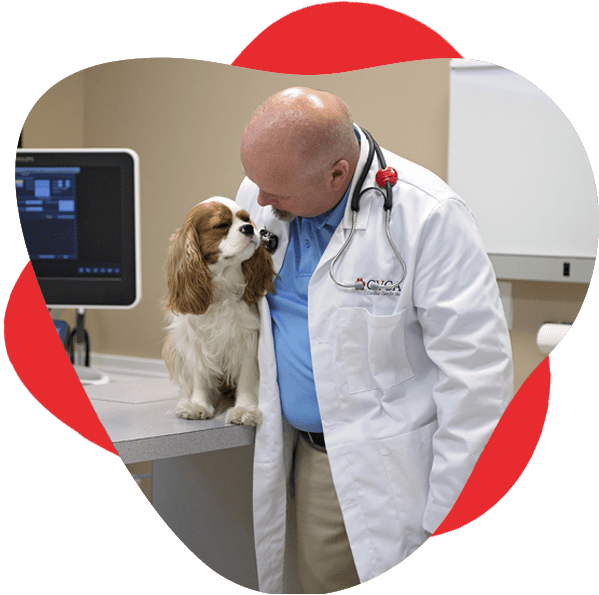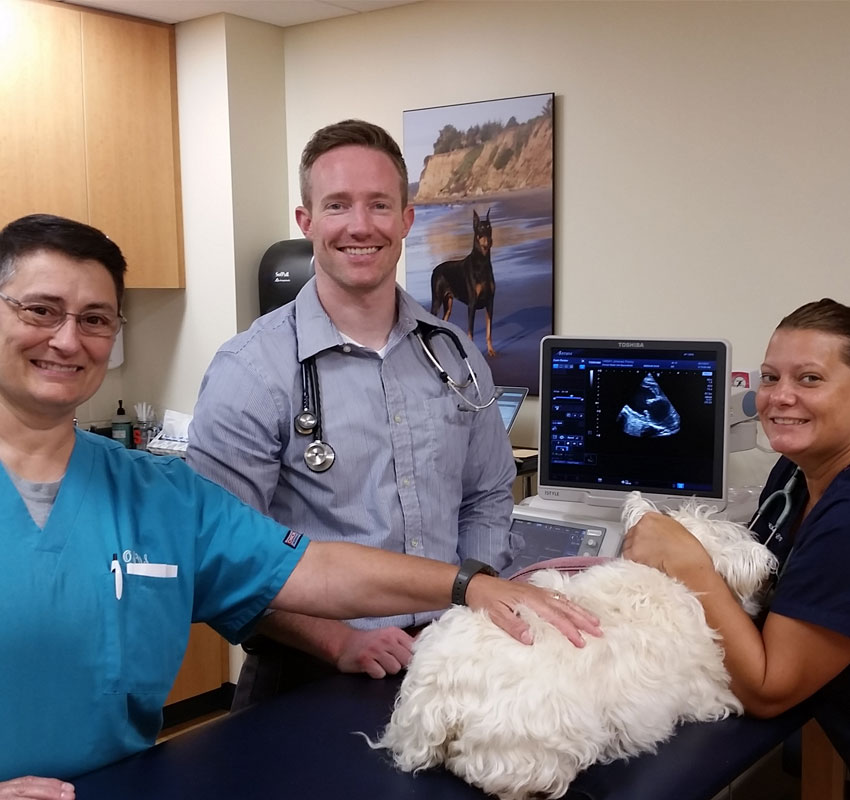Why More Vets Recommend CT Scans For Dogs During Diagnostic Evaluations}
Wiki Article
Checking Out the Vital Solutions Provided by a Veterinary Cardiologist: Understanding Ultrasound and CT Scan Strategies
Vet cardiologists play a vital role in the health of pets by diagnosing and dealing with numerous heart problems. They make use of innovative imaging strategies, such as heart ultrasound and CT scans, to supply exact analyses. Each approach has its distinctive benefits and applications. Recognizing these methods is essential for family pet proprietors seeking the most effective take care of their friends. What elements should pet proprietors consider when choosing in between these diagnostic devices?
The Function of Vet Cardiologists in Pet Healthcare
Veterinary cardiologists play a crucial duty in the medical care of animals, focusing particularly on identifying and dealing with heart-related problems. They have specialized training that permits them to analyze complex diagnostic tests and identify different cardiovascular problems. These specialists make use of innovative techniques, such as echocardiography and electrocardiography, to evaluate heart function and structure accurately.Veterinary cardiologists likewise establish customized therapy strategies that may consist of drugs, lifestyle modifications, and, in some instances, surgical interventions. Their knowledge includes enlightening pet dog proprietors concerning heart wellness, emphasizing the value of routine exams and early detection of possible troubles. Collaboration with general vets is crucial, as it assures extensive take care of pet dogs with suspected cardiac concerns. By providing specialized services, vet cardiologists substantially enhance the lifestyle for family pets and offer assurance for their proprietors, reinforcing the relevance of heart wellness in general animal health.Typical Cardiac Concerns in Family Pets
Common heart issues in pet dogs can considerably impact their wellness and lifestyle. Heart murmurs, numerous sorts of cardiomyopathy, and genetic heart problems are among the most prevalent problems that veterinarians encounter. Cancer Veterinary Near Me. Recognizing these issues is essential for family pet owners to assure prompt diagnosis and proper therapyHeart Murmurs in Pets
Heart whisperings can be a resource of issue for pet dog owners, they are not constantly indicative of severe health problems. A heart whispering is an irregular sound generated by turbulent blood flow within the heart. In pets, these murmurs can be created by numerous factors, including genetic heart defects, valve problems, and even stress during assessments. Several pets with heart murmurs lead normal lives without considerable health and wellness influences. To determine the underlying cause, veterinary cardiologists typically use analysis strategies such as echocardiograms and Doppler ultrasounds. Early detection and assessment are important, as they may assist handle any kind of possible cardiac issues efficiently. Family pet proprietors are urged to consult their veterinarian for a thorough assessment if a heart whispering is identified.Cardiomyopathy Kind Explained
Cardiomyopathy incorporates a team of conditions affecting the heart muscular tissue, leading to compromised cardiac function in animals. One of the most typical kinds consist of dilated cardiomyopathy (DCM), hypertrophic cardiomyopathy (HCM), and restrictive cardiomyopathy (RCM) DCM mostly affects dogs, causing the heart to compromise and enlarge, which decreases its ability to pump blood effectively. On the other hand, HCM is much more prevalent in pet cats, defined by the thickening of the heart walls, often causing obstructed blood flow. RCM, though much less typical, occurs when the heart muscular tissue ends up being rigid, restricting its capability to fill with blood. Each kind provides unique obstacles in medical diagnosis and treatment, demanding specialized vet cardiological evaluation to assure peak administration and take care of influenced animals.Congenital Heart Flaws
Congenital heart issues represent a substantial classification of cardiac concerns in animals, distinct from gotten conditions such as cardiomyopathy - CT Scans For Dogs. These defects are architectural irregularities existing at birth, impacting the heart's normal feature. Common kinds include license ductus arteriosus, ventricular septal issues, and pulmonic constriction. Symptoms might vary widely, varying from light to serious, and can consist of exercise intolerance, coughing, and problem breathing. Early medical diagnosis with advanced imaging techniques like ultrasound is important for efficient management. Veterinary cardiologists play an essential function in identifying these problems and suggesting appropriate treatment alternatives, which might include medical monitoring or surgical intervention. Acknowledging genetic heart defects permits much better results and boosted lifestyle for affected animalsRecognizing Heart Ultrasound: How It Works
A substantial variety of veterinary practices now utilize cardiac ultrasound as a crucial analysis device for evaluating heart health and wellness in pets. This non-invasive method utilizes high-frequency audio waves to produce photos of the heart's framework and feature. Throughout the treatment, a veterinary service technician uses a gel to the pet's upper body and makes use of a transducer to give off ultrasound waves. These waves read more jump off the heart and surrounding structures, producing real-time photos on a monitor.Veterinarians can assess various elements of heart wellness, including chamber size, wall motion, and valve function. Additionally, cardiac ultrasound allows for the detection of irregularities such as fluid accumulation and congenital heart issues. This strategy is crucial for identifying conditions that might not be noticeable with common radiographs. By supplying comprehensive information concerning the heart's makeup and efficiency, cardiac ultrasound aids in formulating reliable treatment plans for animals struggling with cardiovascular disease.The Significance of CT Scans in Detecting Heart Issues
Exactly how do CT scans enhance the medical diagnosis of heart problems in vet medicine? CT scans provide thorough cross-sectional pictures of the heart and bordering structures, permitting veterinarians to imagine intricate physiological relationships. This imaging strategy is especially useful in identifying genetic heart flaws, cardiac lumps, and irregularities in blood vessels. By making use of sophisticated imaging algorithms, CT scans can analyze heart chamber sizes and function, using a detailed sight that may be difficult to achieve with typical methods.Additionally, CT angiography can imagine blood flow and determine locations of stenosis or blockage, which is necessary for planning prospective treatments. The speed and accuracy of CT scans likewise promote quick medical diagnoses, important in emergency situations. Inevitably, the consolidation of CT scans right into vet cardiology substantially improves the precision of diagnoses, making it possible for targeted treatment strategies and improving individual results for pets experiencing heart disease.Comparing Ultrasound and CT Scan Methods
While both ultrasound and CT scans are invaluable tools in veterinary cardiology, they use distinctive benefits and limitations that influence their use in identifying heart disease. Ultrasound, or echocardiography, gives real-time imaging of the heart's structure and function, allowing veterinarians to evaluate heart chambers, valves, and blood flow. It is especially efficient for reviewing problems like heart disease and cardiomyopathy. However, ultrasound may be limited in imagining certain anatomical structures due to client size or obesity.In contrast, CT scans offer in-depth cross-sectional pictures of the heart and bordering cells, making them ideal for identifying structural problems, lumps, or vascular concerns. Although CT scans provide comprehensive insights, they call for sedation and may involve radiation exposure. Ultimately, the choice between ultrasound and CT scans depends on the particular scientific circumstance, the person's problem, and the information needed for an accurate medical diagnosis.Therapy Choices Offered Through Vet Cardiology
Veterinary cardiology provides a variety of treatment alternatives customized to resolve numerous heart problems in pets. Treatment strategies often start with way of life adjustments, including diet plan modifications and workout changes, focused on boosting general heart health and wellness. Drugs play a crucial role, with cardiologists suggesting drugs such as diuretics, beta-blockers, and ACE preventions to enhance and take care of symptoms heart function.In much more serious situations, interventional procedures, such as balloon valvuloplasty or stent placement, might be required to alleviate obstructions or boost blood flow. For sure genetic heart problems, medical alternatives may be checked out to deal with structural issues. Furthermore, recurring surveillance and follow-up care are necessary components of a detailed treatment plan, enabling prompt changes based upon the family pet's feedback to treatment. Overall, veterinary cardiology focuses on supplying reliable, customized like optimize the health and wellness of animal individuals with heart problems.Just how to Prepare Your Pet Dog for a Heart Analysis
Preparing a learn the facts here now pet for a heart assessment is important to guarantee accurate results and a smooth process. Owners should initially set up the visit with the veterinary cardiologist and talk about any type of particular requirements or issues. It is recommended to withhold food for at least 12 hours before the analysis, as this aids boost imaging high quality during procedures like ultrasound or CT scans.Additionally, keeping a tranquil atmosphere on the day of the appointment can help in reducing the pet's anxiousness. It is beneficial to bring along any kind of appropriate medical records, consisting of previous examinations and medicines (Board Certified Veterinary Cardiologist). Owners should additionally make sure that their animal is comfy and leashed throughout find here transport to the facility. Lastly, familiarizing themselves with the evaluation procedure can minimize worries and aid in asking notified questions throughout the consultation. By adhering to these steps, proprietors can add substantially to the efficiency of the heart assessmentRegularly Asked Questions
For how long Does a Cardiac Ultrasound or CT Check Take?
The duration of a heart ultrasound usually varies from 30 to 60 minutes, while a CT check might take roughly 15 to 30 mins. Factors such as the individual's problem can influence these time quotes.
Exist Any Kind Of Risks Related To These Analysis Treatments?

Can I Remain With My Pet During the Procedure?
The veterinary center's plan commonly determines whether animal owners can remain throughout treatments. While some clinics encourage proprietor existence for comfort, others might call for separation to guarantee safety and security and excellent problems for diagnostic imaging.Just how much Do These Analysis Tests Typically Price?
The expenses of diagnostic examinations, such as ultrasound and CT scans, typically differ based upon location and center. Usually, prices vary from a few hundred to over a thousand bucks, showing the intricacy and innovation involved.
What Is the Recuperation Process After a Heart Examination?
The healing process after a heart examination involves checking the family pet for any prompt reactions, ensuring convenience, and limiting physical task. Veterinarians commonly supply post-evaluation instructions to lead animal owners during this essential healing period. Heart whisperings, numerous types of cardiomyopathy, and congenital heart problems are amongst the most prevalent problems that veterinarians come across. A heart whispering is an unusual audio produced by unstable blood circulation within the heart. Cardiomyopathy encompasses a team of diseases impacting the heart muscular tissue, leading to compromised heart function in animals. Genetic heart issues represent a considerable group of heart problems in family pets, distinctive from obtained problems such as cardiomyopathy. Ultrasound, or echocardiography, provides real-time imaging of the heart's structure and function, enabling vets to examine heart chambers, shutoffs, and blood circulation.Report this wiki page